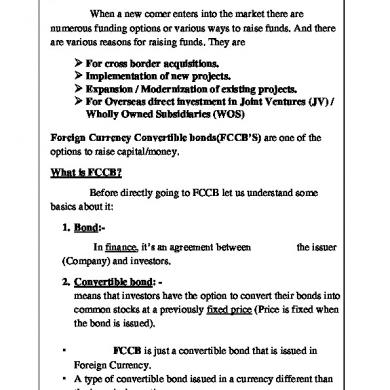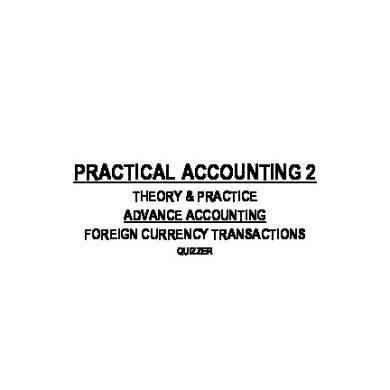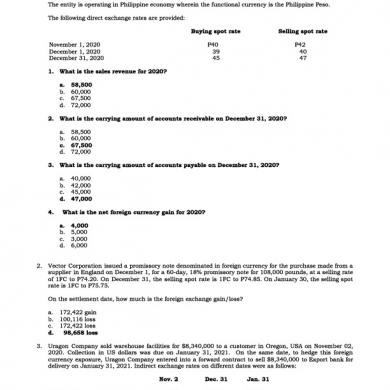Foreign Currency Convertible Bonds
This document was uploaded by user and they confirmed that they have the permission to share it. If you are author or own the copyright of this book, please report to us by using this DMCA report form. Report DMCA
Overview
Download & View Foreign Currency Convertible Bonds as PDF for free.
More details
- Words: 458
- Pages: 4
Loading documents preview...
[Type here]
Foreign Currency Convertible bonds Introduction:When a new comer enters into the market there are numerous funding options or various ways to raise funds. And there are various reasons for raising funds. They are
For cross border acquisitions. Implementation of new projects. Expansion / Modernization of existing projects. For Overseas direct investment in Joint Ventures (JV) / Wholly Owned Subsidiaries (WOS) Foreign Currency Convertible bonds(FCCB’S) are one of the options to raise capital/money. What is FCCB? Before directly going to FCCB let us understand some basics about it: 1. Bond:In finance, it’s an agreement between (Company) and investors.
the issuer
2. Convertible bond: means that investors have the option to convert their bonds into common stocks at a previously fixed price (Price is fixed when the bond is issued). •
FCCB is just a convertible bond that is issued in Foreign Currency. • A type of convertible bond issued in a currency different than the issuer's domestic currency.
[Type here]
• • In other words, the money being raised by the issuing company is in the form of a foreign currency. Example: • when an American company issues a convertible bond in euros because it intends to build a factory in Germany, this is a foreign currency convertible bond. How does it help companies? Gives issuers the ability to access investment capital available in foreign markets. It is a low cost debt as the interest rates given to FCCB are normally 30-50 percent lower than the market rate because of its equity component. Conversion of bonds into stocks takes place at a premium price to market price. Conversion price is fixed when the bond is issued. So, lower dilution of the company stocks. How does it benefit an investor? • Safety of guaranteed payments on the bond • Can take advantage of any large price appreciation in the company’s stock • Redeemable at maturity if not converted • Easily marketable as investors enjoys option of conversion in to equity if resulting to capital appreciation.
[Type here]
Limitations: If the investors do not go for conversion, then companies will be forced to lower the conversion price (Previously Fixed) to entice the investors to go for conversion which will Lead to higher dilution. The exchange risk is more in FCCBs as interest on bond would be payable in foreign currency. Thus companies with low debt equity ratios, large forex earnings potential only opted for FCCBs. FCCB’s means creation of more debt and a forex outgo in terms of interest which is in foreign exchange. If the stock price goes below the conversion price, then the issuer loses an opportunity to dilute at a higher price.
[Type here]
****************************
Foreign Currency Convertible bonds Introduction:When a new comer enters into the market there are numerous funding options or various ways to raise funds. And there are various reasons for raising funds. They are
For cross border acquisitions. Implementation of new projects. Expansion / Modernization of existing projects. For Overseas direct investment in Joint Ventures (JV) / Wholly Owned Subsidiaries (WOS) Foreign Currency Convertible bonds(FCCB’S) are one of the options to raise capital/money. What is FCCB? Before directly going to FCCB let us understand some basics about it: 1. Bond:In finance, it’s an agreement between (Company) and investors.
the issuer
2. Convertible bond: means that investors have the option to convert their bonds into common stocks at a previously fixed price (Price is fixed when the bond is issued). •
FCCB is just a convertible bond that is issued in Foreign Currency. • A type of convertible bond issued in a currency different than the issuer's domestic currency.
[Type here]
• • In other words, the money being raised by the issuing company is in the form of a foreign currency. Example: • when an American company issues a convertible bond in euros because it intends to build a factory in Germany, this is a foreign currency convertible bond. How does it help companies? Gives issuers the ability to access investment capital available in foreign markets. It is a low cost debt as the interest rates given to FCCB are normally 30-50 percent lower than the market rate because of its equity component. Conversion of bonds into stocks takes place at a premium price to market price. Conversion price is fixed when the bond is issued. So, lower dilution of the company stocks. How does it benefit an investor? • Safety of guaranteed payments on the bond • Can take advantage of any large price appreciation in the company’s stock • Redeemable at maturity if not converted • Easily marketable as investors enjoys option of conversion in to equity if resulting to capital appreciation.
[Type here]
Limitations: If the investors do not go for conversion, then companies will be forced to lower the conversion price (Previously Fixed) to entice the investors to go for conversion which will Lead to higher dilution. The exchange risk is more in FCCBs as interest on bond would be payable in foreign currency. Thus companies with low debt equity ratios, large forex earnings potential only opted for FCCBs. FCCB’s means creation of more debt and a forex outgo in terms of interest which is in foreign exchange. If the stock price goes below the conversion price, then the issuer loses an opportunity to dilute at a higher price.
[Type here]
****************************
Related Documents

Foreign Currency Convertible Bonds
January 2021 1
11-foreign-currency-transactionsxx.pdf
January 2021 0
Foreign Currency Hedging
January 2021 1
Accounting For Foreign Currency Transaction.docx
January 2021 0
Bonds
January 2021 6More Documents from "Maketh.Man"

